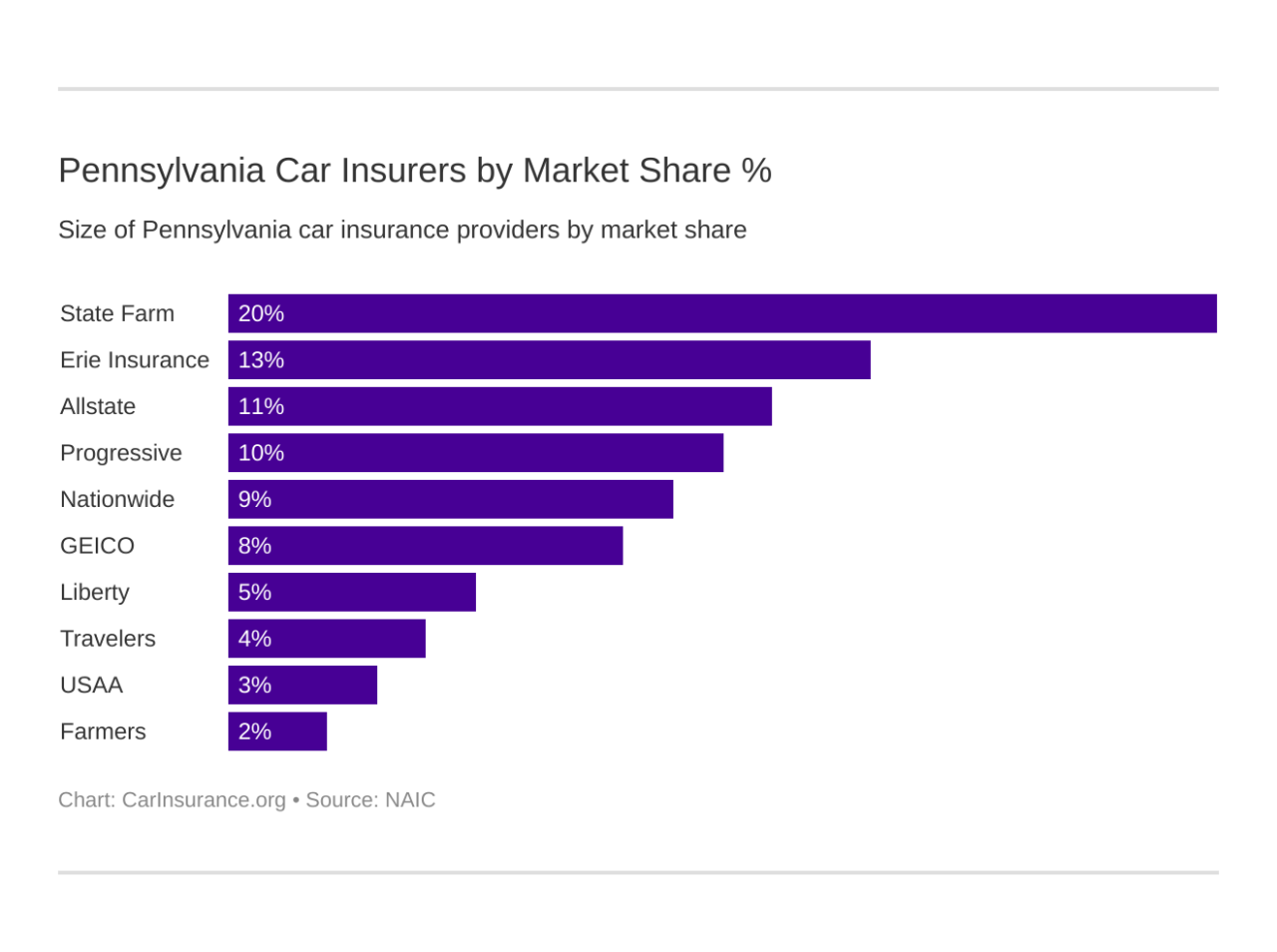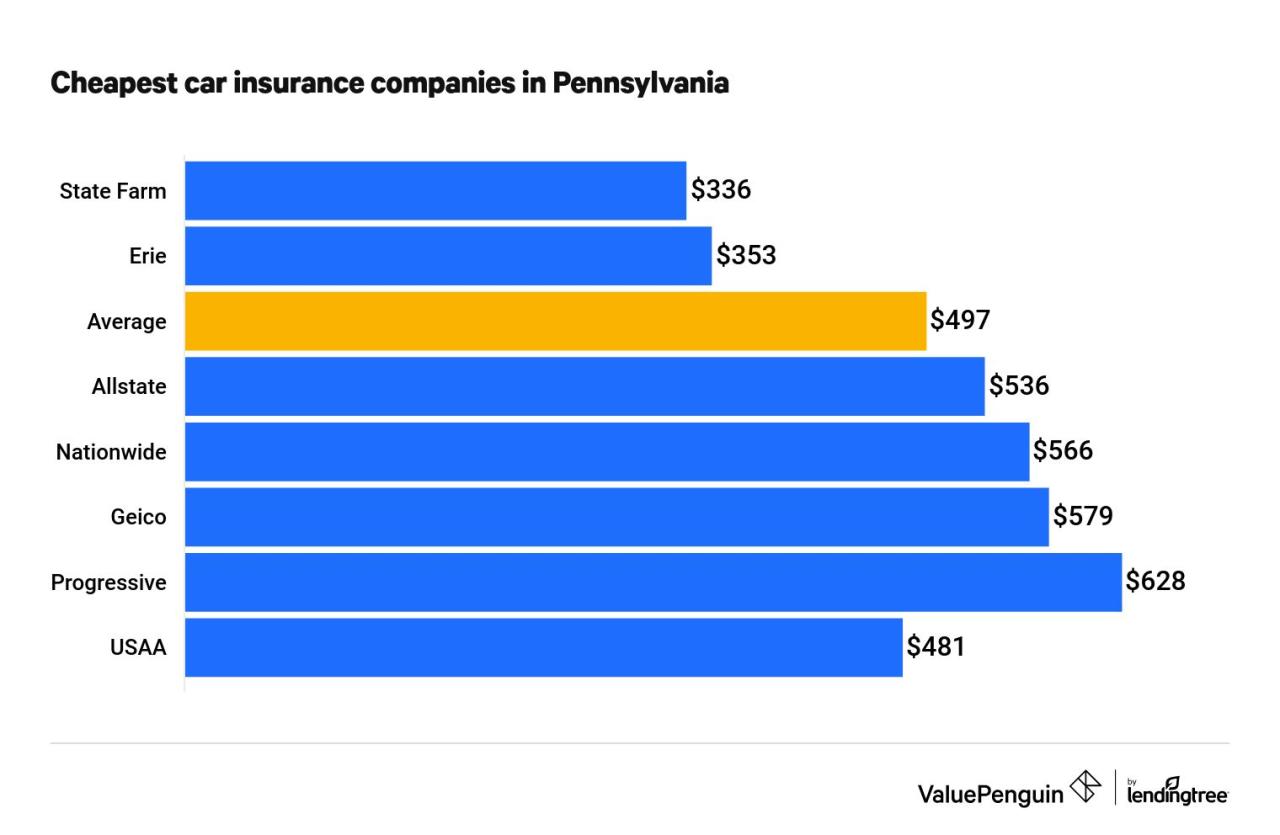Car insurance companies in PA play a vital role in ensuring financial protection for drivers in the state. Pennsylvania’s unique insurance landscape presents both opportunities and challenges for individuals seeking the best coverage at affordable rates.
Navigating the complexities of car insurance in Pennsylvania can be daunting, especially with the wide range of companies, coverage options, and factors influencing rates. This guide aims to demystify the process, empowering you to make informed decisions and secure the right insurance for your needs.
Finding the Best Car Insurance Deal in Pennsylvania

Finding the best car insurance deal in Pennsylvania can be a daunting task, with numerous companies offering various plans and discounts. To make the process easier and ensure you get the most competitive rate, it’s essential to follow a structured approach and compare quotes from multiple providers.
Obtaining Car Insurance Quotes
Getting car insurance quotes from multiple companies is the first step in finding the best deal. This process allows you to compare different coverage options, premiums, and discounts, ultimately leading to a more informed decision. Here’s a step-by-step guide:
- Gather your information: Before you start requesting quotes, have all the necessary information readily available. This includes your driver’s license number, vehicle identification number (VIN), driving history, and any relevant details about your vehicle, such as its make, model, year, and mileage.
- Use online comparison tools: Many websites offer online comparison tools that allow you to enter your information once and receive quotes from multiple insurers simultaneously. These tools are convenient and save you time. Popular options include websites like Insurance.com, The Zebra, and Bankrate.
- Contact individual insurance companies: Besides using comparison tools, you can also directly contact individual insurance companies to request quotes. This allows you to have more personalized conversations with agents and ask specific questions about their plans and discounts.
- Compare quotes and coverage: Once you have received quotes from multiple companies, carefully compare them side by side. Pay attention to the premium amount, coverage details, deductibles, and any additional discounts offered. Ensure you understand the differences between the various plans and their coverage levels.
Negotiating Lower Insurance Premiums
After obtaining quotes from multiple companies, you can leverage this information to negotiate lower premiums. Insurance companies are often willing to work with customers to find a rate that fits their budget. Here are some tips for negotiation:
- Highlight your good driving record: If you have a clean driving history with no accidents or violations, emphasize this to the insurer. A good driving record is a significant factor in determining premiums, and highlighting it can increase your chances of getting a lower rate.
- Bundle your policies: If you have multiple insurance policies, such as home, renter’s, or life insurance, consider bundling them with your car insurance. Many companies offer discounts for bundling policies, leading to potential savings.
- Shop around periodically: It’s essential to shop around for car insurance periodically, even if you’re happy with your current insurer. Rates can change, and new discounts or promotions may be available. By regularly comparing quotes, you can ensure you’re getting the best possible deal.
Comparing Quotes from Various Providers
Comparing quotes from various providers is crucial for finding the best car insurance deal in Pennsylvania. This process allows you to identify the most competitive rates and coverage options tailored to your needs. Here’s why comparing quotes is essential:
- Variety of coverage options: Different insurance companies offer various coverage options, including liability, collision, comprehensive, and uninsured/underinsured motorist coverage. By comparing quotes, you can determine which provider offers the best coverage at the most affordable price.
- Discounts and promotions: Insurance companies often offer various discounts and promotions to attract customers. These discounts can be based on factors such as good driving records, safety features in your vehicle, bundling policies, or membership in certain organizations. Comparing quotes allows you to identify which companies offer the most valuable discounts.
- Competitive pricing: By comparing quotes, you can see how different companies price their insurance policies based on your specific profile. This information helps you identify the most competitive rates and potentially negotiate a better deal with your chosen insurer.
Car Insurance Claims Process in Pennsylvania
Filing a car insurance claim in Pennsylvania can be a stressful experience, but understanding the process can make it smoother. This guide Artikels the steps involved, the role of the insurance company, and your rights and responsibilities as a policyholder.
Steps Involved in Filing a Car Insurance Claim
The process of filing a car insurance claim in Pennsylvania typically involves the following steps:
- Report the Accident: Immediately contact your insurance company to report the accident. Provide them with details like the date, time, location, and parties involved.
- File a Claim: Your insurance company will guide you through the process of filing a claim. You will typically need to provide them with a written statement detailing the accident and any injuries or damages.
- Gather Documentation: Collect all relevant documentation, including police reports, medical records, repair estimates, and photos of the damage.
- Cooperate with the Insurance Company: Be prepared to answer questions from your insurance company and provide them with any requested information.
- Negotiate a Settlement: Once the insurance company has reviewed your claim, they will offer a settlement amount. You have the right to negotiate this amount if you feel it is not fair.
- Receive Payment: If you accept the settlement offer, you will receive payment from your insurance company.
Role of the Insurance Company in Handling Claims
Your insurance company has a responsibility to handle your claim fairly and promptly. This includes:
- Investigating the accident to determine the cause and liability.
- Assessing the damages to your vehicle and any injuries you may have sustained.
- Evaluating your claim and making a settlement offer.
- Paying your claim within a reasonable timeframe.
Rights and Responsibilities of Policyholders
As a policyholder, you have certain rights and responsibilities during the claims process:
- Right to File a Claim: You have the right to file a claim for covered damages or injuries.
- Right to Negotiate: You have the right to negotiate the settlement amount offered by your insurance company.
- Right to Appeal: If you disagree with your insurance company’s decision, you have the right to appeal their decision.
- Responsibility to Cooperate: You have a responsibility to cooperate with your insurance company by providing them with accurate information and documentation.
- Responsibility to Mitigate Damages: You have a responsibility to take reasonable steps to minimize your damages, such as getting your vehicle repaired promptly.
Common Issues and Disputes in Car Insurance Claims
While the process of filing a car insurance claim in Pennsylvania is relatively straightforward, there are some common issues that can arise:
- Determining Liability: Disputes can arise over who is responsible for the accident, especially if there are multiple parties involved.
- Assessing Damages: Disagreements may occur over the extent of the damages to your vehicle or the value of your personal property.
- Medical Expenses: Disputes can arise over the amount of medical expenses covered by your insurance policy.
- Delayed Payments: Insurance companies may delay payments for a variety of reasons, such as needing more information or conducting an investigation.
Tips for a Smooth Claims Process, Car insurance companies in pa
To make the claims process as smooth as possible, consider the following tips:
- Keep Detailed Records: Maintain records of all communications with your insurance company, including dates, times, and the content of conversations.
- Be Prepared to Negotiate: Be prepared to negotiate the settlement amount offered by your insurance company.
- Seek Legal Advice: If you are having trouble resolving your claim, consider seeking legal advice from an experienced attorney.
Car Insurance for High-Risk Drivers in Pennsylvania

If you’ve had a few accidents or traffic violations, you might be considered a high-risk driver in Pennsylvania. This means insurance companies see you as a greater risk, leading to higher premiums. But don’t despair! There are still ways to find affordable car insurance.
How Insurance Companies Assess Risk for High-Risk Drivers
Insurance companies use a complex system to determine your risk level, considering factors like your driving history, age, location, and the type of car you drive. Here’s a closer look at how they assess high-risk drivers:
- Driving Record: This is the most significant factor. Accidents, speeding tickets, DUI/DWI convictions, and other violations all increase your risk. The severity and frequency of these incidents play a crucial role.
- Age: Younger drivers, particularly those under 25, are statistically more likely to be involved in accidents. This is due to factors like lack of experience and higher risk-taking behaviors.
- Location: Areas with high traffic density and crime rates tend to have more accidents, impacting your insurance premiums. Urban areas often have higher rates than rural ones.
- Type of Vehicle: Certain car models are considered more expensive to repair or replace, leading to higher premiums. Sports cars, luxury vehicles, and high-performance cars are often categorized as higher risk.
- Credit History: While controversial, some insurance companies use your credit score as an indicator of your financial responsibility. A lower credit score may suggest a higher risk of filing claims.
Finding Affordable Car Insurance as a High-Risk Driver
Even if you’re a high-risk driver, there are ways to find affordable car insurance. Here’s what you can do:
- Shop Around: Don’t settle for the first quote you receive. Compare rates from multiple insurance companies. Online comparison tools can make this process easier.
- Consider State-Funded Programs: Pennsylvania offers programs like the Pennsylvania Assigned Risk Plan (PARP) for drivers who have difficulty obtaining insurance in the private market. These programs can provide coverage at a higher cost but can be a lifeline for high-risk drivers.
- Improve Your Driving Record: The best way to reduce your risk is to improve your driving record. Avoid traffic violations, drive defensively, and take defensive driving courses. These courses can often lower your premiums.
- Increase Your Deductible: A higher deductible means you pay more out of pocket if you have an accident, but it can significantly reduce your premium. This is a good option if you’re confident you can afford the higher deductible.
- Consider Bundling Policies: Bundling your car insurance with other policies, such as home or renters insurance, can often lead to discounts. This is a common strategy offered by insurance companies to incentivize customers to buy multiple policies.
Car Insurance for Young Drivers in Pennsylvania
Pennsylvania is known for its strict regulations regarding car insurance, particularly for young drivers. These regulations are designed to ensure that young drivers are adequately insured and have the necessary experience before driving independently. The insurance rates for young drivers are generally higher compared to experienced drivers due to factors such as lack of driving experience, higher risk-taking behavior, and statistically higher chances of accidents.
Parental Coverage
Parental coverage, also known as “named non-owner coverage,” can be an excellent option for young drivers. It offers liability coverage for a young driver who is not the owner of the vehicle they are driving. The parent’s insurance policy will cover the young driver, providing financial protection in case of an accident. This coverage can be a cost-effective way to ensure that young drivers are insured while they are building their driving experience.
Graduated Licensing Programs
Pennsylvania has a graduated licensing program designed to help young drivers gradually gain experience and learn safe driving practices. This program involves three stages:
- Learner’s Permit: This stage requires supervised driving with a licensed adult. It allows young drivers to practice driving skills under safe conditions.
- Junior Operator License: This stage allows young drivers to drive with some restrictions, such as nighttime driving curfews and passenger limitations. It encourages young drivers to build driving experience under specific guidelines.
- Full License: After successfully completing the junior operator license stage, young drivers can obtain a full driver’s license with fewer restrictions. This stage allows young drivers to drive independently with the knowledge and experience gained during the previous stages.
Managing Insurance Costs
Managing insurance costs for young drivers can be challenging, but there are strategies to reduce expenses:
- Good Driving Record: Maintaining a clean driving record with no accidents or traffic violations can significantly lower insurance premiums. It demonstrates responsible driving habits and reduces the risk perceived by insurance companies.
- Defensive Driving Course: Completing a defensive driving course can lead to discounts on insurance premiums. These courses teach safe driving practices and help young drivers develop responsible driving habits.
- Good Grades: Some insurance companies offer discounts for young drivers who maintain good grades in school. This reflects a commitment to education and a responsible approach to life.
- Higher Deductibles: Choosing a higher deductible can lower monthly premiums. This means you’ll pay more out-of-pocket if you have an accident, but it can significantly reduce your overall insurance costs.
- Compare Quotes: Getting quotes from multiple insurance companies and comparing rates can help you find the best deal. This allows you to identify the most competitive options and save money on your insurance.
Closing Notes: Car Insurance Companies In Pa
In conclusion, understanding Pennsylvania’s car insurance market is crucial for securing the right coverage and ensuring financial security. By carefully considering factors like your driving history, vehicle type, and desired coverage levels, you can find a policy that meets your individual needs and budget. Remember to compare quotes from multiple companies, utilize available discounts, and stay informed about your rights and responsibilities as a policyholder.
When choosing car insurance companies in PA, it’s important to consider the specific needs of your situation. While coverage for your vehicle is essential, you may also want to explore options like Key Insurance: Protecting Your Businesss Most Valuable Assets , which can safeguard your business assets.
This type of insurance can be particularly valuable for businesses with high-value equipment or inventory. Ultimately, the best car insurance company for you will depend on your individual needs and priorities.
